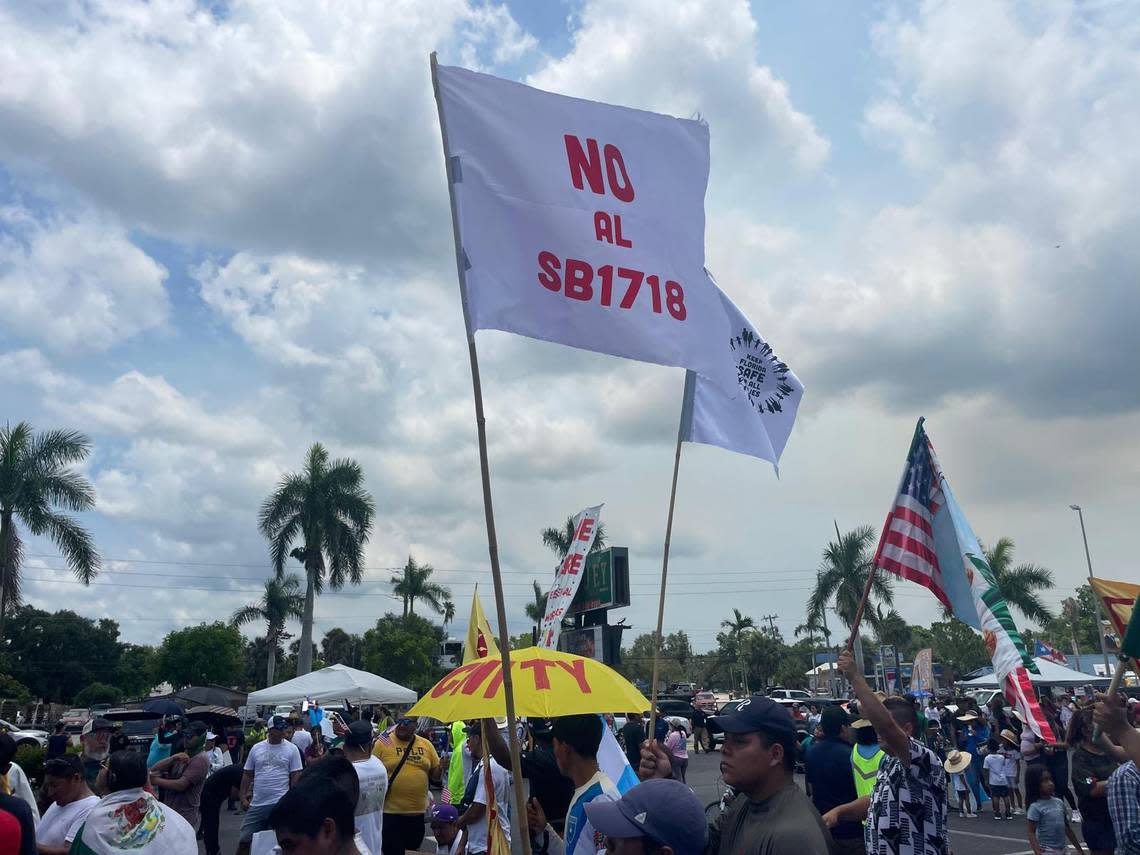Battle over Florida’s immigrant transportation law plays out in Miami court. Will a judge block it?

- Oops!Something went wrong.Please try again later.
- Oops!Something went wrong.Please try again later.
A farmworker advocacy group went head to head in a Miami courtroom with lawyers representing Florida Gov. Ron DeSantis and Attorney General Ashley Moody on Wednesday, the latest development in a federal lawsuit that challenges a section of Florida law that criminalizes the transportation of undocumented immigrants into the state.
U.S. District Judge Roy K. Altman, a Trump-appointed jurist and former prosecutor, is presiding over the case. Lawyers from both parties discussed whether plaintiffs should be able to participate anonymously in the proceedings, if DeSantis should be dismissed as a defendant, and a request to pause the law during litigation. During the three-hour hearing the judge asked both parties several questions about their arguments as well about the previous court decisions they are using to formulate their stances.
The Farmworker Association of Florida, a group of almost 12,000 members that advocates for migrant and seasonal farm workers, first sued DeSantis, Moody, and state attorneys in July over changes to the state’s existing human-smuggling laws during this year’s legislative session in Tallahassee.
The new statute makes it a third-degree felony to “knowingly and willfully transports into this state an individual whom the person knows, or reasonably should know, has entered the United States in violation of law and has not been inspected by the Federal Government since his or her unlawful entry.” Agents for the Florida Highway Patrol, which enforces the law on highways across county lines, had arrested at least three people under the transportation law through late September, according to public records the Miami Herald obtained.
The lawsuit argues that the law is causing extreme harm to people, including mixed-immigration-status families visiting family out of state, clergy members offering service to needy immigrants, and seasonal workers who travel around the country chasing economic opportunity.
The law — which has caused great controversy nationwide and has prompted outrage from immigration rights groups and terror among immigrant residents of the state — is part of a wider package that DeSantis has touted as the “strongest anti-illegal immigration legislation in the country.”
The court spent over an hour discussing a motion from the Farmworker Association for a preliminary injunction, which would block the transportation section of the law while litigation is pending. The lawyers argued that the courts have already deemed it up to Congress, not states, to regulate the movement of migrants. They also said that the legislation did not clarify on the definition of “inspected,” that immigration lawyers are at a loss at to who the law applies to, and that the law is so vague it could apply to millions of people.
Lawyers for the state countered that legislators had narrowed who the law applied to in court documents already, and did not include visa holders, Dream Act recipients and asylum seekers or immigrants in removal proceedings. They added that the law did not “apply to all aliens, just those who have not alerted their presence to federal authorities.”
Several organizations, including the Southern Poverty Law Center, the national and Florida branches of the American Civil Liberties Union, and Americans for Immigrant Justice are representing the Farmworker Association. Other plaintiffs, identified by their initials, include a woman with an autoimmune disorder responsible for a teenage grandchild applying for a special victim immigration status, the director of a nonprofit and a clergyman who drive undocumented immigrants across state lines for medical and immigration-related appointments.
Several members of the Farmworker Association, including its leader based in Apopka, filled two rows of back benches at Wednesday’s hearing. A baby with a pacifier sat on a woman’s lap, while a small boy grazed the floor with his feet.
Part of the hearing also focused on the question of whether plaintiffs identified by their initials should have to reveal their names. Evelyn Wiese, an attorney from Americans for Immigrant Justice, said that “clients were scared to reveal their identities.” She argued that to put their names on public record would be to reveal deeply personal information, could lead to felony charges, exacerbate medical conditions such as depression, spark threats and harassment based on immigration status, and result in the separation of families.
Her clients “risk being branded as human smugglers,” Wiese said.
Lawyers for the state rebutted that they did not intend to cause “needless stress,” but have said in previous court documents that the plaintiffs “fail to meet the high bar required for anonymous treatment” and that the “plaintiffs seek to bypass... the constitutional presumption of judicial openness by proceeding anonymously.”
The lawyers for the state also doubled down on a previous motion they had submitted to dismiss the governor as a party in the case.
“The governor simply can’t enforce” the transportation statute, said one of the lawyers.
The judge wrapped up the hearing saying that the court would rule on the outstanding motions, which include the motion to allow plaintiffs to be anonymous, to dismiss DeSantis as a party, and whether to grant a preliminary injunction, in the coming weeks.

